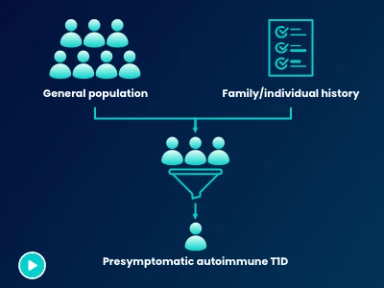- Resource
- BR1DGE
- Early Detection
- Staging
- Video
Exploring Early Detection of Autoimmune Type 1 Diabetes
Screening for autoimmune T1D involves testing for autoantibodies that are markers of destruction of insulin-producing beta cells.
Learning Objectives
- Educate on impacts and benefits of screening for presymptomatic T1D
Summary
When you screen people for type 1 diabetes, you draw blood and measure the presence of autoantibodies recognizing beta cells of the islets of Langerhans producing insulin in their serum. These antibodies are not pathogenic, meaning that they are not responsible for the destruction of the beta cells. However, autoantibodies are very important markers of beta cell destruction. When you measure the presence of autoantibodies, you are able to measure the beginning of the destruction of the beta cells and then to carefully evaluate how the disease is progressing in that individual.
It's a soft landing. You have information, you can learn about how diabetes affects your body. You can meet other people with it and see how they've lived. You can explore various treatments before you must make a decision. You're not sitting there in the moment looking at X treatment, X insulin pump, this medication, and having to decide almost under duress where, you know, when the waiter’s standing in front of you saying, “What do you want to eat? What do you want to drink?”
And you're sitting there thinking: “oh, God, I haven't looked at the whole menu!” But, having awareness of the antibodies and the eventual diagnosis of diabetes, you've got time to take it in, in a way that feels perhaps less frenetic and less intense. As a person living with diabetes thinking about wanting to start my family, the benefit of screening is incredible. I have this level of confidence that my husband and I, should we decide to start our family, our kids will have a head start on their life with diabetes, if that's their destiny. We'll know that they have the antibodies, that will ease that transition into the life that I've lived for 30 years, that was really hard to start with. But there's peace in knowing that it won't be as traumatic or devastating or as surprising as it was for me 30 years ago. The best candidates for screening for type 1 diabetes autoantibodies are siblings and relatives, first-degree relatives of the person with diabetes because they have a higher risk to become diabetes. But we have also to consider that 90% of type 1 diabetes appears sporadically without any familiarity of a person with diabetes. Therefore, also screening the population is very useful.
Making the decision to be screened for type 1 diabetes can feel loaded. I think at this point, type 1 diabetes isn't curable and it's a disease that is treated through the injections of insulin, and we live with it forever. Making the decision to be screened invites in a level of uncertainty and brings with it a layer of fear. Will my life be the same, dependent on these results? And the likelihood is that your life won't be the same. You'll either know that you have a very low likelihood of ever developing the disease, or you'll know with close to certainty that eventually you will develop type 1 diabetes. So, at that point, you've reached a fork in the road. And you can't go back from that knowledge.
MAT-GLB-2405112 -1.0 – 08/2024




